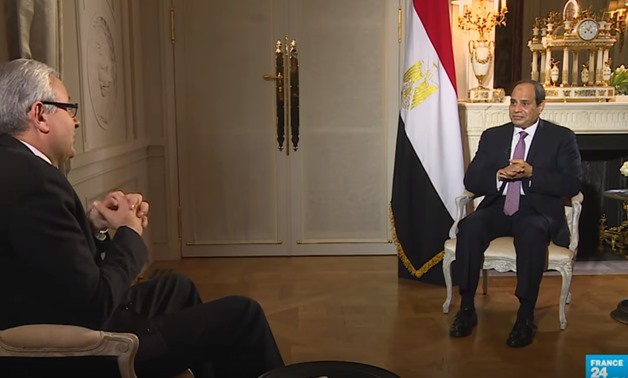
President Abdel Fatah al-Sisi – File Photo
CAIRO – 26 October 2017: President Abdel Fatah al-Sisi discussed Egypt’s relations with Iran, which have been cut off for 40 years, during an exclusive interview with France 24. Asked during many exclusive interviews about Egypt’s relations with Iran, Sisi said that Egypt has no relations with Iran and is concerned only with Arab national security, which is threatened by Iran.
To clarify the history of the diplomatic relations between Egypt and Iran and the reasons behind the poor relations between them, Egypt Today will present a report on how relations have gradually waned to the state they are in now.
The history of relations between Iran and Egypt
Egypt had deep relations with Iran in the 1930s, especially when Egypt's rapprochement with the United States also produced a good relationship with Iran’s Shah Mohammad Reza Pahlavi. Coincidently, the sister of King Farouk, Princess Fawzia Fuad, married Pahlavi in 1939.
However, the revolution that erupted in Iran in 1979 to overthrow the Shah changed the country into a conservative state that suppressed Western cultural influences.
The Arab states also felt threatened by Iran due to their large Shiite communities.
The Iranian Foreign Ministry issued an official statement to sever formal diplomatic ties with Egypt for several reasons, at the forefront of which was the Camp David agreement between Egypt and Israel.
Another reason behind the damaged relations with Iran is related to Khaled El-Islamboli, the army officer who assassinated Sadat in a military parade in 1981. The Iranian government subsequently named a street in Tehran after Islamboli.
To continue its provocative policy with Egypt, Iran has tried to destabilize security not just in Egypt, but also in the region, by funding and inspiring Islamic groups.
However, on April 28, 1991, diplomatic relations were restored at the business level under the toppled President Hosni Mubarak, as Egypt and Iran had common interests. Nevertheless, relations remained tense almost continually.
In addition, coordination between Egypt and Iran is found in many international organizations, and both have a membership in the troika of the Non-Aligned Movement.
Under ousted President Mohammed Morsi, relations developed positively between the two countries. Morsi visited Iran in 2012, which was the first visit to be paid by an Egyptian president since the 1979 revolution. The visit was welcomed and viewed by some as a new chapter between the two countries.
However, after the revolution of June 30, 2013, Egypt’s policy with Iran remained complicated. The Gulf countries are Egypt's main engine, as they were the first to support Cairo following the revolution, particularly Saudi Arabia during the reign of King Abdullah and then King Salman bin Abdul-Aziz Al-Saud.
Resuming relations between the two states is hindered by Iran’s policy in the region, which threatens Arab national security in the region by supporting Shiite minorities, causing chaos in Bahrain and Iraq and posing a great danger to Gulf security, which is an integral part of Egypt’s security.
Egypt’s stance towards Iranian nuclear deal
After the nuclear deal with Iran was signed in 2015, Egypt’s Foreign Ministry noted, “We hope that the deal will be inclusive and be able to prevent the arms race in the Middle East and eliminate all weapons of mass destruction in the region.”
Egypt’s stance towards Iran’s nuclear deal is mainly based on recognizing the rights of the state parties in the treaty on the Non-Proliferation of Nuclear Weapons. In addition, it depends on calling on Iran and the international community to resolve the nuclear deal crisis using diplomatic methods, as well as the rejection of the double standard in dealing with states’ nuclear issues.
On the other hand, when Donald Trump declared that he decided to break the nuclear deal with Iran, Egypt reaffirmed that its stance towards the deal remains the same.
The economic relations between Egypt and Iran
The economic relations between the two countries remain modest, as Iranian investments in Egypt do not exceed $331 million.
Regarding the trade exchange, Iranian exports to Egypt increased to $133 million and Iranian imports from Egypt are estimated to be worth $40 million, said Assistant of Iranian Foreign Minister for Economic Affairs Hassan Kazemi-Qomi during the Egyptian-Iranian Economic Forum in 2012.

Comments
Leave a Comment